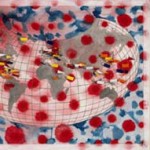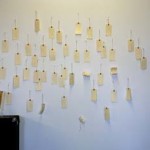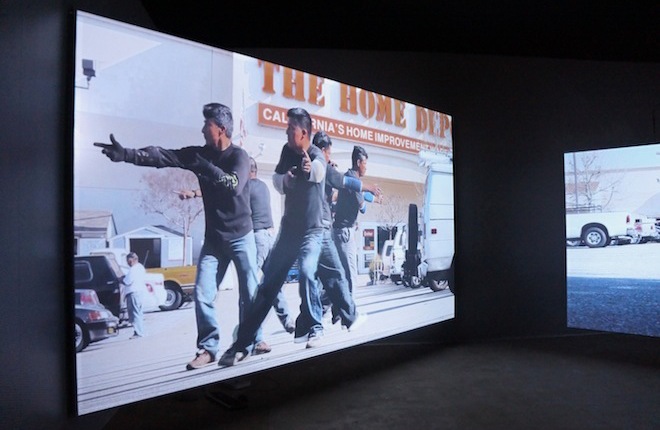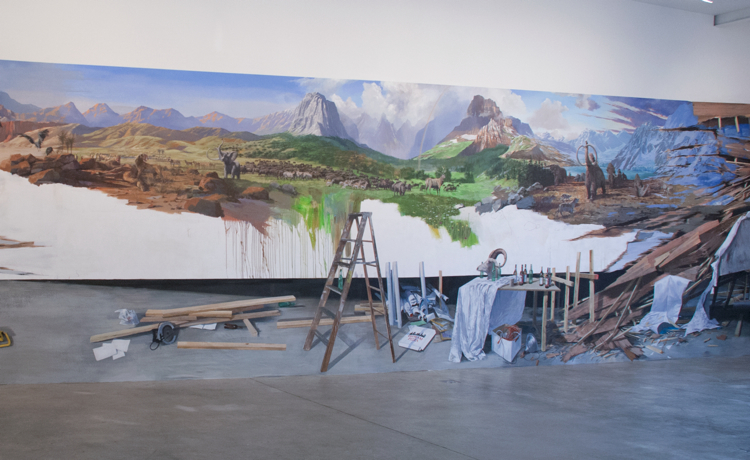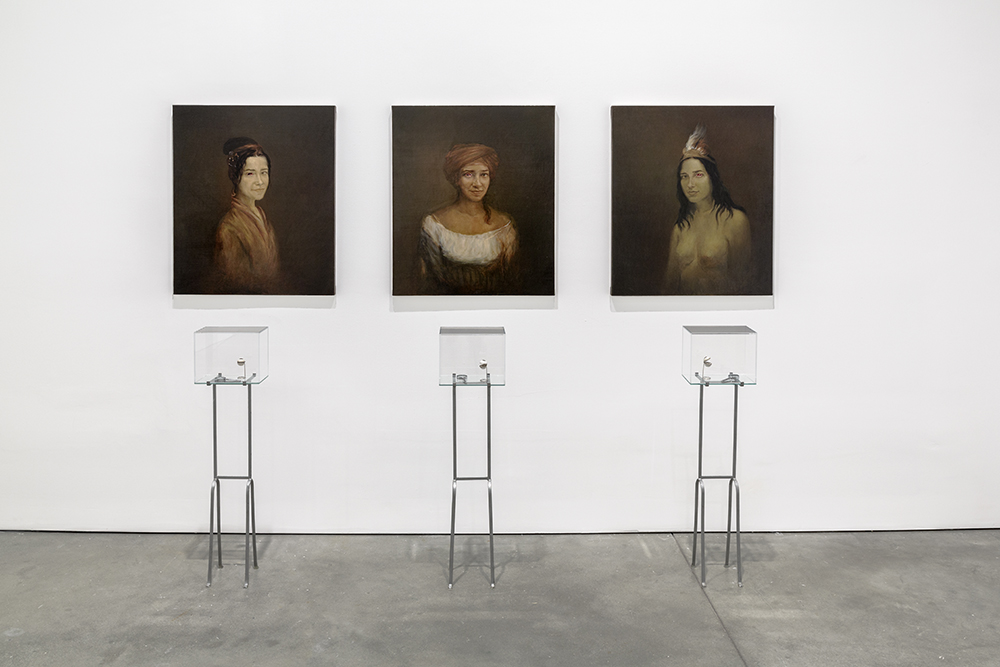By CATHERINE D'IGNAZIO & JANE D. MARSCHING
On Friday, March 9th, 2007, in the South End, iKatun and Jane D. Marsching convened twenty-five Boston artists, curators and art professionals for a conversation about art and activism.
There were a few intentions for the evening: to bring together a community of people who share a set of concerns as well as to identify those concerns. We chose to focus on the act of questioning as a way to map the territories of art and activism, to point to their shared spaces and shifting boundaries.
Presentations of work by elin o’Hara slavick, Jane D. Marsching and the Institute for Infinitely Small Things pointed to some ways in which particular creative practices address the common ground of art and activism. At the beginning of the evening, we distributed pencils and asked our guests to write questions on paper tags and hang them on the wall.
Here are the questions generated by the group:
- How is it possible to be activist without alienating the audience that is critical to change
- What is an aesthetics of activism?
- Does art need to be accessible to everyone if it is also activist?
- Is political art housed in a museum “actionable”?
- What is art’s role vis a vis the political?
- Having this conversation situates us in a privileged position, don’t you agree?
- What is the difference between art and activism?
- 8 Why do so many people assume, claim, and practice that art can affect no social change, that it does not change the world?
- How have strategies (in the U.S. and globally) of art intervention shifted since the 70s/80s—what are the radical gestures, strategies operating today?
- How can we imagine a more open fluid passage between the spheres of art and activism?
- What is the relationship between the artwork and the response? Is the response necessary? What is the benefit of art to the society at large? Can you think of it as a glass of water?
- What is the relationship between the formal concerns of art and the political concerns of a community?
- How much can we measure the affect of activist art as quantity?
- How important is the form?
- Is activist art for artists to get their conscience out? Or for people to hear their message?
- How does the need for documentation/archiving for the art history/art world address the relational/participatory social community of much activist art?
- Why would art be interested in measuring anything?
- How do we define/measure activism?
- How do you move an audience from awareness to engagement?
- Is effective political art propaganda?
- Is successful “political” art always accompanied by a text? Or is it a “text” to begin with?
- Is our definition of activism muddled/collapsed with propaganda? What is the difference?
- Does art lose anything aesthetically when it takes on social purpose? Does activism lose its verve/punch when “tempered” by art?
- Do we need an aesthetics of listening?
- Do you like people? U know them?
- What is activism? Examples?
- What are distribution channels for art & activism?
- Antarctica vs alleyway—do you focus on the big stuff or the little stuff?
- How can activist art projected be documented for not just he art world but also those community partners involved?
- How can art influence the community outside the art world?
- What is the last activist endeavor u participated in?
- Can art enlarge people’s awareness and jettison their participation?
- How to transform awareness into evolvement?
- Do tools matter? How?
- Why do you do art?
- Examples of successful activism?
- What is your race & class?
- What does art do? Particularly art framed as activism? Is a conversation enough?
- If the mainstream accepts activism thru art and other stimuli, would activists reject this acceptance because it has become mainstream?
- Why do we separate art & activism? Does profit compromise art? Is the collective dependent upon the individual?
- Does censorship give that which it stifles—the message—legitimacy?
- Can we start to specify the mechanisms by which art can make change?
- What do you think of terrorism?
- Art and activism metrics?
- How do you move an audience from awareness to engagement?
We will be creating another event to create another space for this community to gather and continue the conversation.
“The Commons” on The Common
Friday, June 1, 5:30 – 7:30PM
A picnic on the Boston Common where we will discuss “the Commons” in relation to the work of three invited guests, including Iain Kerr of Spurse and others.
Email us to receive email updates about these events.
About the Artists
elin o'Hara slavick is an activist, artist and professor of studio art, theory and practice at unc, chapel hill. her work has addressed issues of labor, alternative histories, violence, feminism, the body, the global economy, tourism and travel. her work has been exhibited across the u.s. and in canada, cuba, europe, hong kong, england and scotland. her monograph book, Bomb After Bomb, with a foreword by Howard Zinn, is of protest drawings of places the u.s. has bombed. it will be released fall, 2007, on Charta Books (Milan, Italy).
Jane D. Marsching’s current project is an interdisciplinary collaborative hybrid art, science, and research project exploring climate change, sustainability, and the Arctic. One current project is Climate Commons: a networked conversation about climate change, sustainability, and the Arctic, developed with Matthew Shanley, which took place from November 27 2006 - February 28, 2007.
The Institute for Infinitely Small Things is a performance research group that includes between 5- 20 members at any given time. The Institute uses performance in public space to research the micro-power structures that shape everyday life in Western society. These social and political tiny things have included corporate ads, street names, maps and post-9/11 security terminology.
iKatun is an artist-run organization whose mission is to present contemporary art that fosters public engagement in the politics of information. iKatun supports art projects, organizes exhibitions and conferences, publishes critical writing, runs workshops and fosters community locally and internationally. iKatun was founded in 2000 as a 501(c)3 organization based in Boston, MA.
All images are courtesy of the artists.


